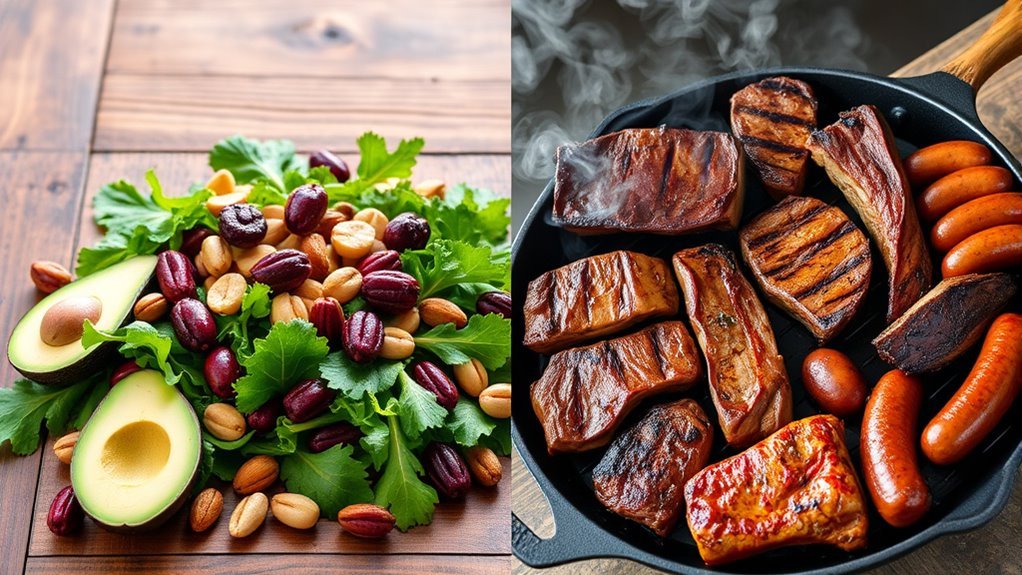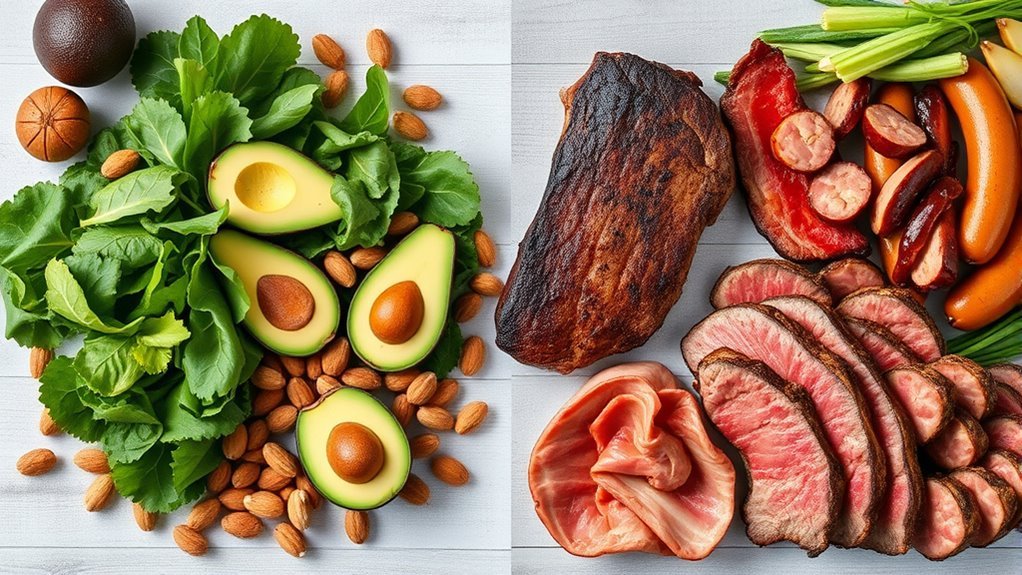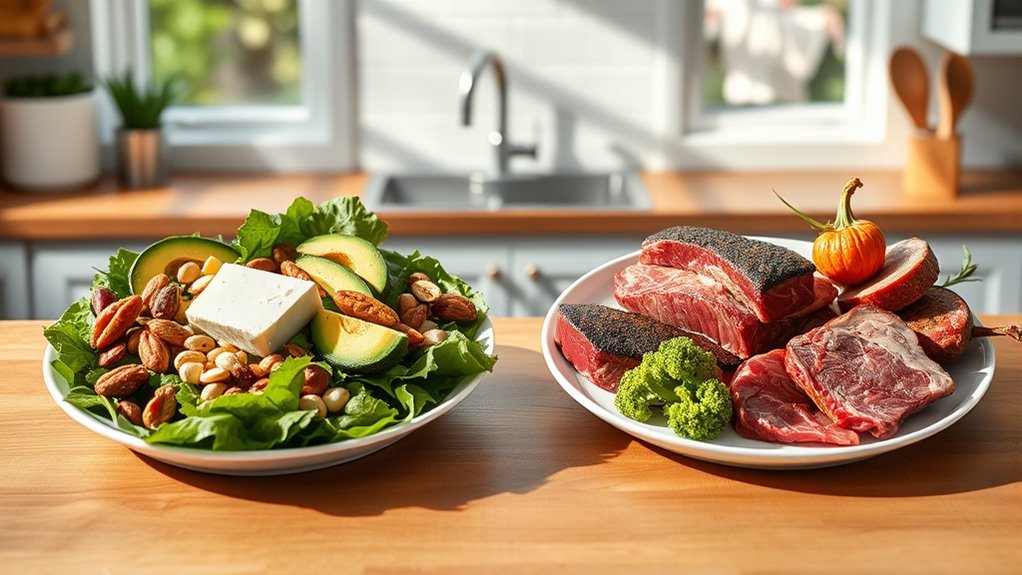The Keto and Carnivore diets differ mainly in their food variety and macronutrient balance. Keto emphasizes high fats, moderate protein, and low carbohydrates, allowing for various foods like vegetables and nuts. In contrast, the Carnivore diet strictly focuses on animal products, limiting your options to meat, fish, and eggs. While Keto can help prevent nutritional deficiencies, Carnivore may risk them due to its restrictive nature. There’s more to explore about these diets and how they fit your goals.
Overview of the Keto Diet

The keto diet, which emphasizes high-fat and low-carbohydrate intake, can help your body enter a state of ketosis, where it burns fat for fuel instead of glucose. By prioritizing keto meals rich in healthy fats—like avocados, nuts, and olive oil—you’ll feel satisfied and energized. Choosing nutrient-dense keto snacks, such as cheese or hard-boiled eggs, can also keep you on track between meals. This approach not only supports weight loss but can improve mental clarity and overall well-being. You’ll enjoy the freedom to explore diverse flavors and recipes while still maintaining your dietary goals. Remember, it’s about finding what works for you and creating a sustainable lifestyle that fuels your body effectively. Embrace the journey!
Overview of the Carnivore Diet

While you may be familiar with various dietary approaches, the carnivore diet stands out by focusing exclusively on animal-based foods. This approach can be liberating, allowing you to simplify your meal planning. Here are some key aspects to take into account:
The carnivore diet simplifies meal planning by focusing solely on animal-based foods, offering a liberating approach to nutrition.
- Nutrient Density: Animal products are rich in essential nutrients, providing vitamins and minerals often lacking in plant-based diets.
- Simplicity: Carnivore meal plans typically consist of meat, fish, and animal-derived products, making grocery shopping straightforward.
- Satiation: High protein and fat content can lead to increased feelings of fullness, reducing the urge to snack.
When exploring the carnivore diet, keep nutrient considerations in mind to guarantee you’re meeting your body’s needs while enjoying the freedom of a simplified eating approach.
Key Principles of the Keto Diet

Unlike the carnivore diet’s strict focus on animal products, the ketogenic (keto) diet emphasizes a high-fat, low-carbohydrate approach that encourages your body to enter a state of ketosis. To achieve this, you’ll need to monitor your keto macros—typically aiming for about 70-75% of your calories from fats, 20-25% from protein, and only 5-10% from carbohydrates. This shift helps your body adapt to burning fat for fuel rather than carbohydrates, a process known as fat adaptation. As you embrace this lifestyle, you’ll likely experience enhanced energy levels, reduced cravings, and improved mental clarity. The keto diet provides you the freedom to explore a variety of delicious, satisfying foods while working toward your health goals.
Key Principles of the Carnivore Diet
If you’re considering the carnivore diet, it’s essential to understand its fundamental principles, which revolve around consuming only animal products. This approach emphasizes meat-based nutrition and serves as an elimination diet, removing potential allergens and irritants from your meals. Here are three key principles to keep in mind:
- Animal Products Only: Focus exclusively on meat, fish, and animal-derived foods, excluding all plant-based items.
- High Protein and Fat: Prioritize fatty cuts of meat for energy and satiety, ensuring you meet your nutritional needs.
- Personalized Approach: Listen to your body’s cues and adjust your intake based on how you feel, promoting freedom in your dietary choices.
Allowed Foods in the Keto Diet
To effectively follow a keto diet, it’s essential to know which foods are permitted, as this will help you achieve and maintain a state of ketosis. Focus on high-fat, low-carb foods like avocados, nuts, seeds, and fatty fish. Incorporate plenty of non-starchy vegetables, such as spinach and broccoli, for essential nutrients. For your meal planning, consider including quality proteins like chicken, beef, and eggs. Don’t forget about delicious keto snacks like cheese or pork rinds to satisfy cravings between meals. By understanding these allowed foods, you’ll have the freedom to create varied, satisfying meals that align with your health goals, all while enjoying the journey towards better well-being.
Allowed Foods in the Carnivore Diet
The carnivore diet primarily consists of animal-based foods, allowing you to focus on meats, fish, eggs, and certain animal-derived products. Here are some key food categories you can enjoy:
The carnivore diet emphasizes animal-based foods, focusing on meats, fish, eggs, and select animal products for a rich nutritional profile.
- Meat Types: Opt for beef, pork, lamb, and poultry for your protein sources.
- Fish Varieties: Include fatty fish like salmon and sardines for healthy omega-3s.
- Dairy Options: If tolerated, full-fat dairy like cheese and butter can complement your meals.
When meal planning, consider incorporating organ meats for their nutrient density. You can cook using various methods like grilling or roasting, and don’t forget to explore allowed seasonings like salt and pepper. By sourcing high-quality ingredients, you’ll achieve a nutritional balance that supports your lifestyle. Recipe ideas abound, keeping your meals exciting!
Health Benefits of the Keto Diet
As you explore the health benefits of the keto diet, you’ll find that it can lead to significant improvements in weight management and metabolic health. Many people experience keto weight loss due to reduced insulin levels and increased fat burning. This low-carb approach shifts your body into a state of ketosis, effectively utilizing fat for energy instead of glucose. Alongside weight loss, you may notice enhanced keto mental clarity, as ketones provide a stable energy source for your brain. This can lead to improved focus and cognitive performance, freeing you to tackle daily tasks more efficiently. Ultimately, the keto diet offers a unique opportunity for those seeking to reclaim control over their health and well-being.
Health Benefits of the Carnivore Diet
While the keto diet emphasizes a low-carb approach for weight loss and metabolic health, the carnivore diet takes a more restrictive stance by advocating for an all-animal product intake. This can lead to some impressive health benefits:
- Inflammation Reduction: Many find that eliminating plant-based foods helps lower inflammation, which can boost overall health.
- Digestive Health: With a focus on animal products, you may experience improved nutrient absorption and digestive comfort.
- Mental Clarity: Many adherents report enhanced energy levels and mental clarity, thanks to stable blood sugar.
Additionally, the carnivore diet can support weight management and muscle preservation while offering potential autoimmune benefits and a satiating factor that keeps cravings at bay. It’s a unique approach that provides freedom in food choices!
Potential Risks and Considerations
Although many people experience benefits from the carnivore diet, it’s important to contemplate potential risks that may arise from such a restrictive eating pattern. One significant concern is nutritional deficiencies, as the exclusion of plant-based foods can limit essential vitamins and minerals. Additionally, long-term sustainability of this diet is questionable, as it may not be feasible for everyone. Individual variations in metabolism and health status also play an important role; what works for one person might not work for another. As a result, if you’re considering this diet, seeking medical supervision is wise to monitor your health and address any potential issues. Ultimately, staying informed and attuned to your body’s needs will empower you to make the best choices for your well-being.
Which Diet Is Right for You?
Choosing between the keto and carnivore diets really hinges on your health goals and dietary preferences. If you’re aiming for weight loss or improved metabolic health, keto may align better with your needs, while the carnivore diet might suit you if you prefer a more straightforward, meat-focused approach. Ultimately, it’s essential to contemplate what you enjoy eating and how each diet fits into your lifestyle for long-term success.
Health Goals Alignment
How do you determine which diet aligns best with your health goals? Your health motivations and dietary objectives can guide your choice between keto and carnivore. Consider these factors:
- Weight Management: Are you focused on losing or maintaining weight? Keto may offer flexibility with carbs while carnivore emphasizes protein.
- Energy Levels: Do you seek stable energy throughout the day? Both diets can enhance energy, but they do so through different macronutrient profiles.
- Nutrient Intake: Are you concerned about micronutrients? The carnivore diet may lack diversity, while keto allows for a range of nutrient-dense foods.
Ultimately, understanding your personal health goals will empower you to make a choice that supports your journey toward freedom and well-being.
Dietary Preferences Consideration
When considering which diet might suit you best, it’s essential to reflect on your personal preferences and lifestyle. The keto diet offers a range of options with some flexibility, allowing for various dietary restrictions, which can be appealing. Meanwhile, the carnivore diet is more restrictive, focusing solely on animal products. Think about your lifestyle choices—do you enjoy cooking with diverse ingredients or prefer simplicity?
Additionally, ethical considerations may guide your decision; if animal welfare is important to you, the carnivore diet may pose a dilemma. Ultimately, it’s about finding a balance that respects your dietary restrictions while aligning with your values. Choose a path that empowers you to thrive, giving you the freedom to enjoy your meals without compromise.
Frequently Asked Questions
What is the keto diet?
The ketogenic diet, or keto diet, is a high-fat, low-carbohydrate eating plan designed to induce a state of ketosis, where the body burns fat for fuel instead of carbohydrates. Typically, the macronutrient ratio in a keto diet is around 70-80% fats, 15-25% protein, and 5-10% carbohydrates. This significant reduction in carb intake forces the body to rely on fat stores, leading to weight loss and potential health benefits such as improved blood sugar control and enhanced mental clarity.
What is the carnivore diet?
The carnivore diet is an extreme form of a low-carb diet that involves consuming only animal products. This means that followers of the carnivore diet eat meat, fish, eggs, and animal-derived products like dairy, while completely eliminating all plant foods. The primary goal of this diet is to simplify food choices and maximize the intake of protein and fats while minimizing carbohydrates. Proponents claim it can lead to weight loss, improved energy levels, and better mental clarity, although it lacks a diverse array of nutrients typically found in fruits, vegetables, and grains.
How do keto and carnivore diets differ in terms of food variety?
The primary difference between the keto and carnivore diets lies in the variety of foods allowed. The keto diet permits a range of foods, including certain low-carb vegetables, nuts, seeds, and dairy products, in addition to meat and fish. This allows for more flexibility and a broader nutritional profile. In contrast, the carnivore diet strictly restricts intake to animal products only, which means no fruits, vegetables, grains, or legumes. This can limit nutrient diversity and may lead to deficiencies if followed long-term without careful planning.
Are there health benefits associated with both diets?
Both the keto and carnivore diets have been associated with various health benefits, although research is still ongoing. The keto diet has been shown to aid in weight loss, improve insulin sensitivity, and may help in managing certain neurological conditions, such as epilepsy. The carnivore diet advocates claim benefits like weight loss and reduced inflammation, though there is less scientific research on its long-term effects. It’s important to consult healthcare professionals when considering either diet to ensure nutritional needs are met and to monitor health indicators.
Which diet is more sustainable long-term?
Sustainability can vary based on individual preferences, lifestyle, and health goals. The keto diet may be considered more sustainable for many people due to its flexibility and variety, which can help prevent monotony and make it easier to stick to over time. On the other hand, the carnivore diet’s restrictive nature may be challenging for some individuals to maintain long-term, especially given its lack of food diversity. Ultimately, the best approach is one that aligns with personal health needs, preferences, and lifestyle, and consulting a healthcare provider can help in making an informed choice.
References
- https://www.ncbi.nlm.nih.gov/pmc/articles/PMC8480497/
- https://www.health.harvard.edu/blog/the-ketogenic-diet-and-its-impacts-on-health-202107132553
- https://www.ncbi.nlm.nih.gov/pmc/articles/PMC6470860/
- https://www.who.int/news-room/questions-and-answers/item/dietary-fats-and-health
- https://www.medicalnewstoday.com/articles/what-is-the-carnivore-diet
- https://www.ncbi.nlm.nih.gov/pmc/articles/PMC6975858/
- https://www.verywellfit.com/carnivore-diet-vs-keto-diet-5191615
- https://www.healthline.com/nutrition/carnivore-diet-guide


